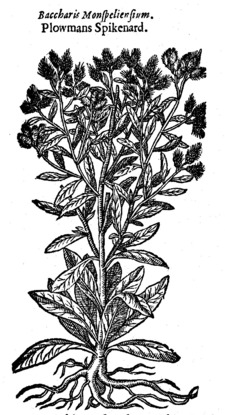
Gerard's Herbal - Part 3

Fig. 1175. Ploughman's Spikenard
The Description.
About this plant Baccharis there hath been great contention amongst the old and new writers; Matthiolus and Dodonĉus have mistaken this plant, for Conyza maior, or Conyza helenitis cordi; Virgil and Athenĉus have confounded Baccharis, and Azarum together: but following the ancient writers, it hath many blackish rough leaves, somewhat bigger than the leaves of Primrose: amongst which riseth up a stalk two cubits high, bearing at the top little chaffy or scaly flowers in bunches, of a dark yellowish or purple colour, which turn into down, and are carried away with the wind, like unto the kinds of thistles: the root is thick, gross, and fat, spreading about in the earth, full of strings: the fragrant smell that the root of this plant yieldeth, may well be compared unto the savour of Cinnamon, Helenium, or Enula Campana, being a plant known unto very many or most sorts of people, I mean in most parts of England.
The Place.
Baccharis delighteth to grow in rough and craggy places, and in a lean soil where no moisture is: it groweth very plentifully about Montpellier in France, and divers places in the West parts of England.
The Time.
It springeth up in April, it flowereth in June, and perfecteth his seed in August.
The Names.
The learned herbarists of Montpellier have called this plant Baccharis: the Grecians, Bachcharis, or after others, Pancharis, by reason of that sweet and aromatical savour which his root containeth and yieldeth: in English it may be called the Cinnamon Root, or Ploughman's Spikenard: Virgil in his seventh Eclogue of his Bucolics maketh mention of Baccharis, and doth not only show that it is a garland plant, but also such a one as prevaileth against enchantments, saying,
-- Bacchare frontem
Cingite, ne vati nocet male lingua futuro.
With Ploughman's Nard my forehead girt,
Lest evil tongue thy poet hurt.
Baccharis is likewise an ointment in Athenĉus, in his 15th book, which may take his name of the sweet herb Baccharis: for as Pliny writeth, Aristophanes of old, being an ancient comical poet witnesseth, that ointments were wont to be made of the root thereof: to be brief, Crateuas his Asarum is the same that Dioscorides his Baccharis is. This plant here described is the Conyza maior of Matthiolus, Tragus, and others.
The Temperature.
Baccharis or Ploughman's Spikenard is of temperature very astringent or binding.
The Virtues.
A. Baccharis, or the decoction of the root, as Paulus Ĉgineta briefly setteth down, doth open the pipes and passages that are stopped, provoketh urine, and bringeth down the desired sickness: the leaves thereof for that they are astringent or binding, stop the course of fluxes and rheums.
B. Baccharis is a singular remedy to heal inflammations and Saint Anthony's fire, called Ignis sacer, and the smell thereof provoketh sleep.
C. The decoction of the roots of Baccharis helpeth ruptures and convulsions, those also that have fallen from an high place, and those that are troubled with the shortness of breath.
D. It helpeth also the old cough, and difficulty to make water.
E. When it is boiled in wine it is given with great profit against the bitings of scorpions, or any venomous beast, being implastered and applied thereto.
F. A bath made thereof and put into a close stool, and received hot, mightily voideth the birth, and furthereth those that have extreme labour in their childing, causing them to have easy deliverance.